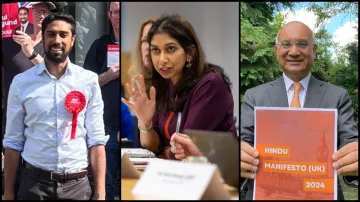UK Elections 2024: Here's how Indian-origin candidates stack up in high-stakes polls
This year's UK election is expected to deliver the most diverse Parliament in the history of the country, including MPs of Indian heritage. At least 15 Indian-origin MPs were elected last time in 2019 and a record-breaking candidates from the community have been nominated in 2024.

London: As the UK is witnessing a high-stakes election that is widely expected to result in a Labour victory over Prime Minister Rishi Sunak's Conservatives, several Indian-origin candidates are also playing a dominant role in the British political landscape. According to reports, the UK election is expected to deliver the most diverse Parliament in the history of the country, particularly in the number of parliamentarians of Indian heritage.
An analysis by the British Future think tanks shows the Labour Party is set to have by far the largest number of ethnic minority MPs if the party wins an overall majority and even more in a landslide scenario. With 14 per cent of MPs coming from ethnic minority backgrounds, the analysis finds that the new Parliament will be closer than ever to reflecting the diversity of the British electorate.
The last general election in 2019 resulted in 15 MPs of Indian heritage crossing over the line, many of whom are contesting again alongside several first-timers. Conservative Party MP Alok Sharma and Labour veteran Virendra Sharma are among the most high-profile British Indians not seeking re-election this time.
Who are the key Indian-origin candidates in UK this year?
Some of the key British Indian candidates to watch in Thursday's polls include Praful Nargund, who is contesting for the Labour Party in Islington North – the seat of the party’s now-suspended former leader Jeremy Corbyn, who is contesting as an Independent candidate. Other Labour candidates include Jas Athwal from Iford South, Baggy Shanker from Derby South, Satvir Kaur from Southampton Test and Harpreet Uppal from Huddersfield.
Rajesh Agrawal, the Indore-born former Deputy Mayor of London for Business, is fighting to become a first-time MP from Leicester East. He is taking on another fellow Indian-origin candidate, Shivani Raja, from the rival Conservative Party. Goan-origin MP, Keith Vaz, is also in the race as an Independent candidate.
The Conservatives have also fielded Ameet Jogia in Hendon, Chandra Kanneganti in Stoke-on-Trent Central and Abbas Merali, a Kenyan-Gujarati Muslim councillor, from Harrow West. Warinder Juss in Wolverhampton West, Gurinder Singh Josan in Smethwick and Bihar-born Kanishka Narayan in Vale of Glamorgan seek to make strides for the Labour Party. In an unprecedented measure, PM Rishi Sunak can reportedly lose his seat in Richmond and Northallerton. His former colleagues Priti Patel and Suella Braverman are expected to fare better in Witham and Fareham and Waterlooville respectively.
The Labour Party has also nominated Navendu Mishra in Stockport, while Preet Kaur Gill, the first British Sikh female MP, serves as UK Shadow Minister for Primary Care and Public Health, re-elected from Birmingham Edgbaston in 2019. Other Labour MPs include Lisa Nandy in Wigan, Seema Malhotra in Feltham and Heston and Valerie Vaz in Walsall South.
The Liberal Democrats have also nominated multiple Indian-origin candidates, including Munira Wilson in Twickenham, Gayathri Sathyanath in Havant, Anita Prabhakar in Nottingham East, Parmjit Singh Gill in West Bromwich, and Dhruv Sengupta in Feltham & Heston.
Labour's testy relationship with Indian community
The Indian community is one of the largest communities in the UK. However, their relationship with the Labour Party in the past has not been so smooth. During former Labour leader Jeremy Corbyn's tenure, the party experienced a decline in support from the Indian community due to perceived anti-India sentiments and controversies surrounding Kashmir.
This factor likely pushed Indians closer to Conservatives, helped by the election of Indian-origin Rishi Sunak as PM. Under Starmer's leadership, the Labour Party has recognised the growing political clout of the Indian-origin population and has tried to stamp out 'anti-India sentiments'. It has also focused its foreign policy approach as deemed crucial to British Indians.
The Labour Party has been focusing on highlighting how they stand ready to get the free trade agreement with India over the line after the Tories missed their Diwali 2022 deadline. However, certain challenges remain like immigration, Tory gains under Rishi Sunak and others. However, Indian support for Conservatives has plummeted due to the escalating cost-of-living crisis and the beleaguered healthcare system.
A ‘Hindu Manifesto’ was launched by an umbrella group of British Hindu organisations for the first time ahead of a British general election, calling on elected representatives to take proactive steps to protect Hindu places of worship and tackle anti-Hindu hate. According to the 2021 census, around 1 million people living in Britain identify as Hindus, making this electorate quite a sizable chunk in the July 4 general election.
In the final weekend of campaigning, Sunak visited the BAPS Shri Swaminarayan Mandir in Neasden on Sunday to promise to keep trying to “make the community proud” while Starmer chose Swaminarayan Temple in Kingsbury to reiterate his commitment to building a “strategic partnership with India”.
(with inputs from agencies)